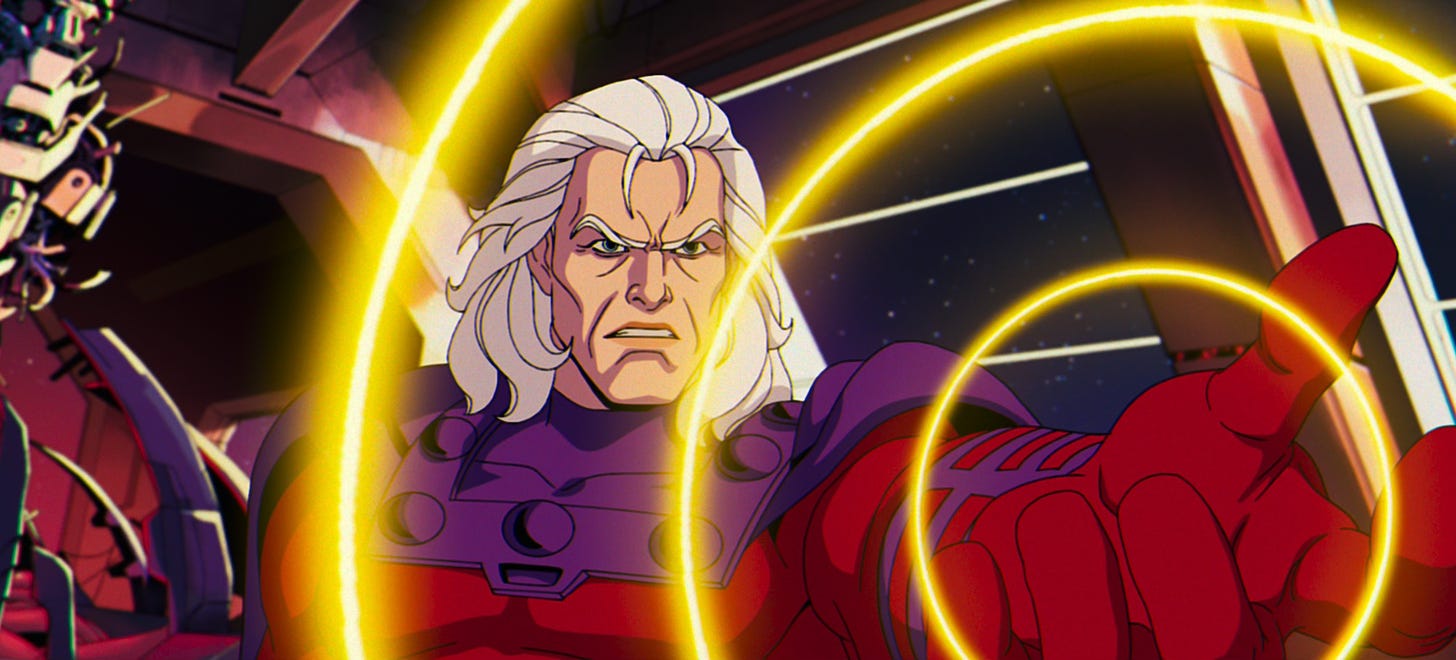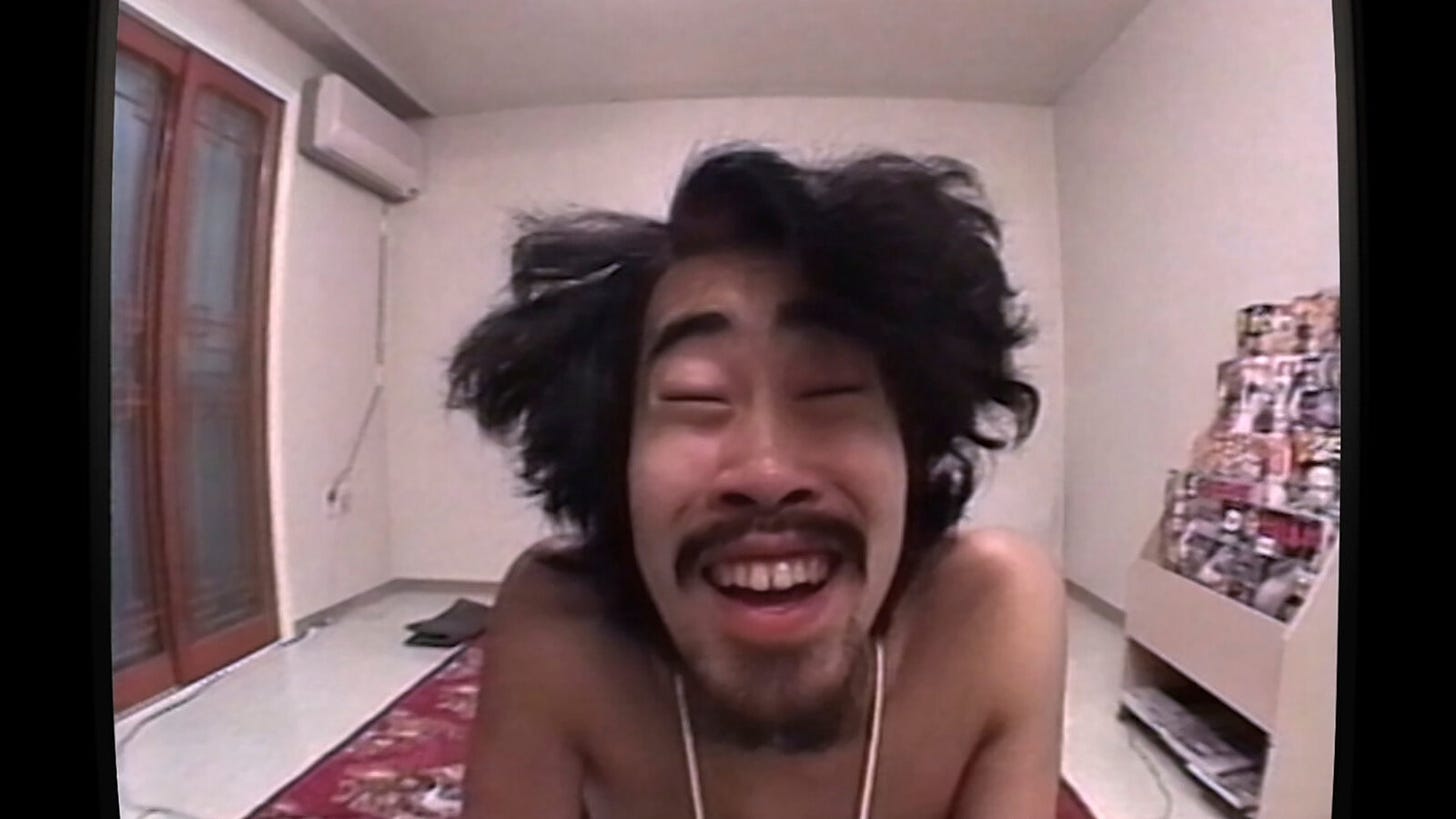'X-Men '97' Offered a Surprising Blend of Melodrama and Cynicism
Humanity: can't live with 'em, and...can't live with 'em.
[Spoilers ahead for the first season of X-Men ‘97]
X-Men ‘97 wrapped its first season this morning. While the show started with the terrific blend of corniness and melodrama that made the original series so endearing it evolved into a more mature series that wrestled with the core question at the heart of the best X-Men stories: how do we deal with intolerance? The comics were born out of the civil rights protests of the 1960s, but for decades, the storytelling took a clear side—the peace-loving Charles Xavier is right, and Magneto, while his pain is understandable, is wrong.
The first season of X-Men ‘97 started from an interesting place where a presumed-dead Xavier (Ross Marquand) bequeathed his school, his X-Men, and his legacy to Magneto (Matthew Waterson). The first half of the season sees Magneto trying to do right by Xavier’s dream only to have it all come crashing down when thousands of mutants are massacred at the haven country of Genosha. The second half of the season reveals the massacre to be the work of Bastion (Theo James), a mutant-machine hybrid who effectively works on behalf of the sentinels (mutant-killing machines) to both eliminate mutants and transform humans into sentinel drones.
The show concludes with Magneto agreeing with Xavier only insofar as a willingness to save the X-Men. Magneto’s Asteroid M is about to crash into Earth because humanity fired a bunch of missiles at it, and so Magneto ends up saving humanity only because that meant saving his fellow mutants. For a show that grew out of a Saturday morning cartoon, that’s a fairly dark conclusion—humanity is beyond saving because they’d rather destroy themselves than live alongside anyone deemed inhuman. Instead of trying to reconcile this point, the X-Men get blinked out of time. A few remain in the present, but some get tossed into the distant past (where they meet next season’s likely Big Bad, Apocalypse) while Cyclops (Ray Chase) and Jean Grey (Jennifer Hale) end up 2,000 years in the future.
The show’s bleak outlook feels like a fair reflection of our own prevailing attitudes. We want heroes like the X-Men, but there’s an underlying sense that our self-destructive attitudes only further isolate us. Xavier’s dream of mutant/human coexistence remains just that—a dream. While in typical Marvel fashion, the ending of the season gives way to teasing the next chapter (although to be fair, the original animated series also loved its cliffhangers), what struck me most was the season finale’s ambivalence. The show acknowledges that Magneto is correct to give up on humanity, and that any heroism on his part is to protect the X-Men, his found family. The first season doesn’t have an answer to how you live alongside people who think you shouldn’t exist, and perhaps that’s for the best. As its viewers have grown up, X-Men has grown up too, and while pat solutions about harmonious living may make for pleasant endings, X-Men ‘97 knows that we’re too old now to unquestioningly accept such a conclusion.
What I’m Watching
I’ve been on a bit of a documentary kick lately. I watched The Contestant on Hulu, which is the story of Tomoaki “Nasubi” Hamatsu, a Japanese man who was basically put into a solitary confinement as reality TV without his knowledge. Think The Truman Show except instead of suburban 1950s idyll, it’s one room you can’t leave until you win 1,000,000 yen worth of prizes. It’s a fascinating story, but I wasn’t thrilled with how the director tried to couch it in an uplifting ending. Not everything is all’s-well-that-ends-well.
I also watched Laura Poitras’ All the Beauty and the Bloodshed. It’s partly about artist Nan Goldin’s life, and it’s partly about her fight against the Sacklers for their role in creating the opioid epidemic. I was incredibly impressed with how Poitras brought these two threads together to show Goldin’s lifelong work as finding the truth and complexity of life through her art contrasted against the Sacklers, who wanted to put their name on a bunch of galleries, but clearly had no interest in the humanizing effect that the work in those galleries can create.
Finally, I caught All That Breathes, Shauken Sen’s documentary about brothers Mohammad Saud and Nadeem Shehzad and their attempts to rescue birds of prey from the onslaught of pollution in their home of New Dehli. It’s a beautiful and lyrical story that never has to hammer you over the head with its message about our fragile relationship to the planet. It’s also inspiring to see these guys who have next-to-nothing devoting themselves to this noble task, and it makes you feel like you can do something too rather than looking at the larger problem and feeling nothing but despair.
What I’m Reading
I’m 100 pages into Final Cut, and I honestly thought I’d like it more. I typically devour tales of Hollywood production fiascos, but so far, author Steven Bach seems far more interested in executive conflict. That’s not nothing, and it’s clear he’s trying to set up both the history that led to United Artists fortunes in the late 1970s (the company was bought by Transamerica, its old regime departed to found Orion Pictures, and there was a new crew trying to make movies under a company that didn’t understand the film business) as well as the warring personalities, but there comes a point where C-suite intrigue only provides a snapshot of corporate culture in 1978. I’m hoping it picks up once Heaven’s Gate gets into production, but so far, I feel like I’m grinding through this book.
In other reads:
What Directors Love About Nicole Kidman by Carlos Aguilar [The New York Times] - I am tickled that at this point in her career, Kidman is probably better known for her memorable AMC Theatres ad than her Oscar-winning performance in The Hours (in all fairness, the AMC Theatres ad is ingratingly earnest, and The Hours is a chore), but it is thrilling to see an actor who continues to give her all to every performance and only gets better with age. It’s not that every movie she does is amazing, but I liked that the directors she’s worked with throughout her career all comment on not only her talent, but her professionalism. That may seem like a minor thing, but professionalism in screen acting—showing up to your 18-hour day ready to work—is a major reason why some actors stick around and others don’t.
Anya Taylor-Joy Still Can’t Make Sense of What She Went Through by Kyle Buchanan [The New York Times] - If you loved Buchanan’s book about Mad Max: Fury Road (as I did), then this is semi-sequel of sorts as he talks to Anya Taylor-Joy, the star of the upcoming prequel, Furiosa: A Mad Max Saga. It is kind of remarkable to see how fast Taylor-Joy’s career has rocketed since her breakthrough performance in The Witch in 2015. She also seems to have a good head on her shoulders, but this article explains why she has a movie star quality that other young performers lack.
J.K. Rowling Used to Want to Debate Gender. Now She Just Insults Trans People by Miles Klee [Rolling Stone] - My instinct isn’t to feel bad for a billionaire who spends her days spreading hate and vitriol against a margainalized community. And yet, there’s a part of me that, like Daniel Radcliffe, just feels sad about J.K. Rowling. There is clearly no one in her life who will tell her, “You need to step away from the computer.” She’s addicted to the dopamine hits she gets from self-righteous fury and battling with people on social media. Rowling’s wealth and success may be unique, but this kind of isolation is not. What’s even sadder is that the ones who will ultimately pay the price are the trans people who suffer at the hands of those who pick up Rowling’s hateful rhetoric.
What I’m Hearing
I thought this was a fascinating story since Japan was such a powerhouse in the 1980s (I think of Marty McFly’s line in Back to the Future Part III when he tells Doc all the best stuff is made in Japan), but then suffered through “lost decades” of stagnant economic growth. This episode of Planet Money shines a light on why that happened, and how Japan struggled to get its economy growing again.
What I’m Playing
I’m about to hang it up with Duolingo after 100 days. Full credit to the Duolingo folks for pulling out every gamifying trick in the book (rankings! badges! XP!), but eventually you can’t deny that microtransaction gaming is the app’s true purpose, not language instruction. A big problem is that there’s little in the way of grammar instruction, and while Duolingo can explain those rules, that costs extra. I never expected full fluency from Duolingo, but I am a little frustrated that I still don’t know after three months when to use “es” versus “está.”
I’ve decided to move on to Animal Well, a game that I’ve heard is a contender for Best of 2024, and it’s included in my PlayStation Plus Extra subscription. I’ll let you know what I think next week.





